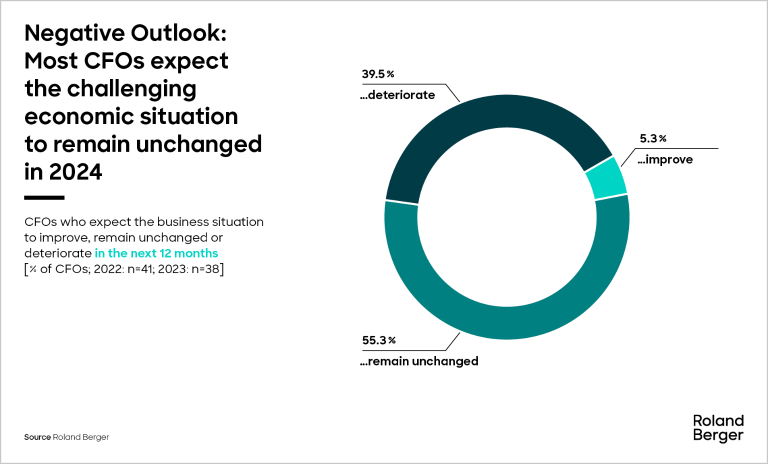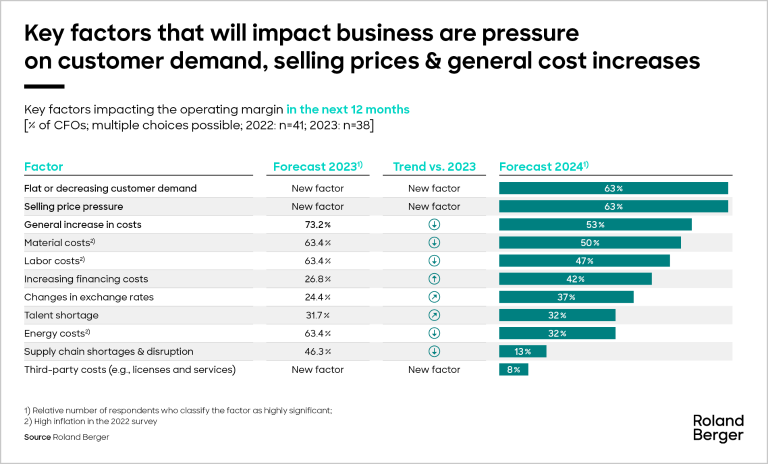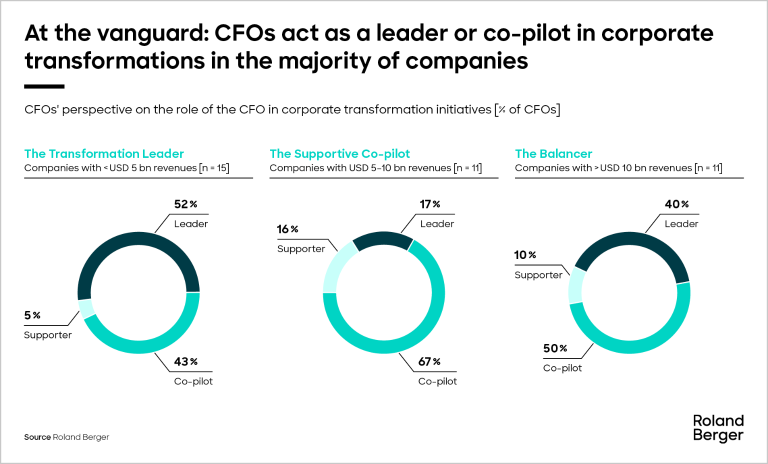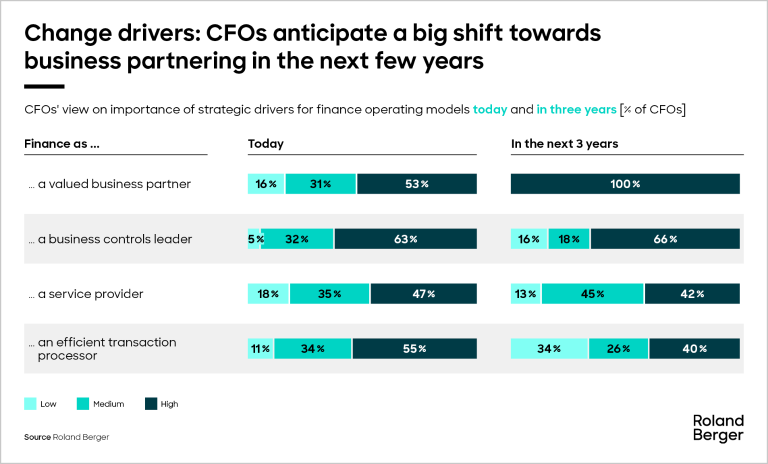Our survey offers valuable insights to help navigate the current uncertainty.


The new CFO – transformation leader, change driver, value creator
By Stephan Hartmann and Milko Teofilov
Our recent survey reveals that CFOs are playing an increasingly strategic role in corporate transformation
Our new survey finds that difficult economic times are leading to big changes in the role of CFOs. Finance executives are becoming leaders of corporate transformations, helping to drive change in organizations through new strategic finance operating models that create value. So what does this mean for today’s CFOs?

Companies, and especially their finance teams, have had a tough time navigating the headwinds of the past few years. Rising interest rates and costs, destabilizing global events and disruptive supply chains have all conspired to push operating models to their limits, and forced significant changes. Unfortunately, the economic situation in 2024 is likely to remain equally uncertain. Corporate transformation to adjust finance operating models and better manage this new reality is therefore a must.
This presents major challenges, particularly for CFOs, whose role is evolving fast to meet them. So how are CFOs dealing with the current situation, what transformational challenges do they believe the future holds and how do they see their role and models changing to ensure future success?
To answer these questions, we surveyed dozens of CFOs at Swiss-based companies, both big and small across all major industries. We found that CFOs are increasingly at the vanguard of transformation, with a central role in steering corporate change while rethinking the finance operating model. In particular, three key messages stood out:
- The economic outlook over the next 12 months remains very challenging, with CFOs highlighting rising concerns around customer demand and price pressures
- The role of CFOs is changing: finance executives are becoming leaders of corporate transformations, acting as catalysts for change and shaping their companies' future trajectory.
- CFOs foresee a shift towards a more strategic finance operating model, in which they embrace the need for transformation and actively contribute to value generation.
Below we outline the findings behind these three key messages and look at their implications, primarily for Swiss businesses but also more widely. Similarly to last year’s survey, almost 80% of respondents are Swiss-based, a similar number work at group CFO or finance executive level and three quarters work in companies with annual revenues of greater than USD 1 billion. The majority work in the industrial products and services, consumer goods, energy, or healthcare industries.
Economic outlook for the next 12 months: Tough times to come, with demand and cost pressures
Our respondents paint a bleak picture for the economy in 2024, predicting a very challenging business landscape in Switzerland and beyond. Most (59%) believe there will be no change in the current economic climate, while 40% think the situation will deteriorate further. This compounds the similarly negative sentiment recorded in the 2023 survey and indicates significant alarm among businesses.
In particular, respondents highlighted top-line challenges such as flat demand and increasing price pressures (both cited by 63% as a key factor impacting operating margin), as well as bottom-line issues such as a general increase in costs (73%). Supply chain disruption (46%) and talent shortages (32%) were other major concerns. Interestingly, concerns about financing costs have risen, with 42% citing them as a factor compared with only 26% last year, perhaps reflecting the current sustained high interest rates.
"CFOs play a crucial role in corporate transformations and need to consider how to acquire and retain relevant talents to execute such programs."
To deal with these challenges, CFOs are increasingly expected to monitor economic trends, adapt to market dynamics and guide organizations through uncertain times.
Role of CFOs in corporate transformation: Drivers and leaders in a challenging environment
The roles of today’s CFOs are expanding beyond traditional boundaries. In addition to balancing the books, they are now catalysts for change, shaping their companies' future trajectory. As a result, CFOs must demonstrate visionary leadership in corporate transformation.
Our survey results reflect their increasingly important role in effecting this shift. For example, today’s CFOs are involved in a diverse range of transformation initiatives. Asked for their views on the primary drivers of corporate transformations in the past two years, ‘improvement of corporate performance’, ‘enablement of digitalization’ and ‘turnaround in a crisis’ were named as the most relevant parts of a CFO’s role, especially in mid-size (USD 5-10 billion revenues) and large companies (>USD 10 billion revenues). ‘Modernization of core technologies’ and ‘divestitures, acquisitions and joint ventures’ also scored highly. On the other hand, ‘improvement of competitive situation’ and ‘simplification of organization’ were seen as less relevant. The results highlight the need for CFOs to be adaptable to specific objectives. They also emphasize that CFOs are now transformers, not cost cutters.
CFOs also see themselves as leaders of organizational transformation. This is particularly true in smaller companies (>USD 5 billion revenues), where a majority of CFOs say they act as the sole transformation leader. In mid-size firms, most CFOs take on the role of a co-pilot of transformation, while in larger businesses, CFOs lead but leave delivery responsibilities to others.
But no matter who is leading it, corporate transformation is fraught with major challenges. Our respondents cited a shortage of workforce capacity and skills as the main obstacle (74%), with a lack of structure and tools to execute transformation another major barrier to driving change (45%). An unsuited existing corporate culture was considered the third biggest challenge (39%).
Evolution of finance operating model: A shift to business partnering and skills to generate value
A precarious economic situation, high stakeholder expectations and significant transformation challenges are putting existing finance operating models under extreme pressure. To keep up, they need to be adjusted.
Our survey results show that CFOs recognize this, and are taking action to adapt their models. They no longer see the finance function as purely transactional, rather they envisage a shift towards a more strategic finance function that generates value and contributes to the company’s overall success. Business partnering is a particular focus area, with the share of respondents rating it as highly important set to almost double to 100% over the next three years. Conversely, the importance of efficient transaction processing is declining. This shift highlights a key challenge for CFOs in improving business partnering: transaction processing is part of the job of a CFO, that has to be done. However, expending a lot of time and effort on it limits capacity to be a valued business partner.
To give an idea of the overall direction of travel of finance models, our survey also sought the views of CFOs on new finance functions that we think will be increasingly relevant over the next three years. Foremost among these was a rebalancing of workforces towards strategic and business-minded skillsets. A total of 87% of respondents rated it as highly important and 13% as of medium importance. This emphasizes the overarching importance of talent, workforce and skills to corporate transformations and explains why they are the top priority on CFOs’ agendas.
The need to exploit data to make appropriate decisions based on data points also scored highly (92% highly important, but 3% low importance), as did the trend towards business-savvy finance leaders, a particularly important area in business partnering.
Implications: Defining CFOs’ new strategic role
It’s clear from the survey findings that CFOs are taking on a more strategic role in corporate transformation. But what does this mean and what actions should they take to effect the change? Below we outline the key implications for CFOs:
Optimizing top and bottom line: With predictions of a deteriorating economic situation, CFOs should place a strong focus on company-wide performance in terms of both top and bottom line ("CFO as a guardian of company-wide performance")
Protecting margins: Stagnating or declining customer demand, greater selling price pressure and a general increase in costs are calling for holistic performance programs
Driving transformation excellence: CFOs play a crucial role in corporate transformations and need to consider how to acquire and retain relevant skills/capacities to execute such programs
Evolving finance operating model: Organizations' finance operating models are changing from transaction processor to strategic supporter and business partner ("value and impact consideration")
Shifting priorities: Data, talent, business partnering and associated skills, and a more resilient central finance operating model will be increasingly relevant in the future.









